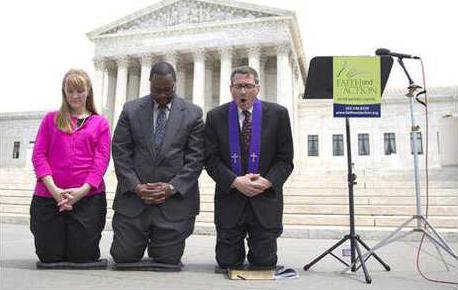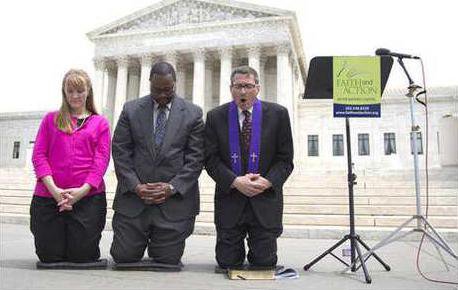WASHINGTON – The 5-4 Supreme Court decision Monday upholding prayers at local government meetings pleased supporters who cheered the second endorsement of "legislative prayers" in 30 years as a victory for freedom of speech.
But opponents said the ruling could impose "second-class citizenship" on those who don't share the dominant faith of a given community.
Writing for the majority, Justice Anthony Kennedy said that government could not mandate a legislative prayer "to a generic God" to avoid offending someone in the room. He added that unless legislative prayers show a pattern of proselytizing or denigration of other faiths "a challenge based solely on the content of a prayer will not likely establish a constitutional violation."
The decision caps the contentious case of Town of Greece vs. Galloway, in which two residents of the small New York town eight miles northwest of Rochester, complained that only four of 127 "guest chaplains" opening town meetings with prayer were not Christians.
Residents Susan Galloway, who is Jewish, and Linda Stephens, an atheist, each objected to the imbalance, and allege they were told either to stop attending meetings or "not listen" to the prayers. A federal appeals court in New York held the prayers to be unconstitutional and the town appealed.
Monday's ruling comes more than three decades after a 1983 case, Marsh v. Chambers, where the court held that the Nebraska Legislature's custom of opening meetings with prayers by a paid chaplain did not violate the Establishment Clause of the First Amendment, which says the state may not "establish" a religion "or prohibit the free exercise thereof."
'Legislative prayer' victory
Daniel Blomberg, legal counsel with the Becket Fund for Religious Liberty, which supported the Town of Greece in the case, applauded the latest ruling.
"Both the majority opinion and the dissenting opinion affirm legislative prayer is constitutional," he said. "At a very high level, today's opinion is a unanimous victory for legislative prayer, a time-honored tradition of allowing government to reflect the beliefs of its citizens."
Blomberg said those who opposed the Town of Greece's prayer policy "want you to create this majoritarian definition of prayer that has to be the way everyone prays. It was an attack on the diverse policy the Town of Greece has: they invited everyone to pray and never refused anyone from participating." He said opponents were "asking for government-mandated type of prayers, and the court soundly rejected that."
In referencing "legislative prayer," the ruling says nothing concerning other controversial public prayers that have landed in court, such as those offered at public school football games or public high school graduations.
But Blomberg said that the reasoning in Monday's ruling about the role of faith in public life could impact another controversial case, Sebelius v. Hobby Lobby Stores, Inc. In that case, the Green family, which owns the national craft store chain, is seeking exemption from a government contraceptive mandate, which the family says is against its religious beliefs.
"What the Green family is asking is for the (Supreme) Court to recognize the same thing it did in (the) Town of Greece (case), that the government should not be hostile to religion, and recognize that religion is a fundamental part of what citizens are," Blomberg said.
Minority religions ignored?
But not all religious freedom advocates liked the court's latest legislative prayer ruling.
Douglas Laycock, a law professor at the University of Virginia in Charlottesville and who argued the case for Galloway and Stephens before the high court, said the ruling doesn't bode well for minority religions.
"The local majority can do anything it wants ... that's what this opinion says," he said.
Laycock, who worked with Americans United for the Separation of Church and State in representing Galloway and Stephens, said it would be better "not to have prayer in the public part of government meetings."
By sanctioning "legislative prayer" at the council meetings, Laycock said, "it's a green light for local majorities to impose their religious practices on anyone who wants to participate in civic affairs."
Justice Elena Kagan, who led the dissenting bloc, apparently agreed with Laycock's concern about the content of the prayers.
"I think the Town of Greece’s prayer practices violate that norm of religious equality — the breathtakingly generous constitutional idea that our public institutions belong no less to the Buddhist or Hindu than to the Methodist or Episcopalian," she wrote.
She chided the town's practice that led to more than a decade of "prayers steeped in only one faith, addressed toward members of the public, commenced meetings to discuss local affairs and distribute government benefits. In my view, that practice does not square with the First Amendment’s promise that every citizen, irrespective of her religion, owns an equal share in her government."
But Kennedy, in the majority opinion, dismissed concerns such as those voiced by Laycock and Kagan, noting the sectarian prayers heard in Congress during America's earlier years.
"The decidedly Christian nature of these prayers must not be dismissed as the relic of a time when our nation was less pluralistic than it is today," the justice wrote. "Congress continues to permit its appointed and visiting chaplains to express themselves in a religious idiom. It acknowledges our growing diversity not by proscribing sectarian content but by welcoming ministers of many creeds."
Kennedy also stated the purpose and practical boundaries for such orations: "Prayer that is solemn and respectful in tone, that invites lawmakers to reflect upon shared ideals and common ends before they embark on the fractious business of governing, serves that legitimate function."
Religious reaction
While many Christian groups including the Alliance Defending Freedom, Liberty Counsel and the Faith and Freedom Coalition applauded the move, some strict separationists demurred. K. Hollyn Hollman, an attorney for the Baptist Joint Committee for Religious Liberty, which supported the Americans United case, told the Deseret News her group would be happier with a moment of silence at a town council meeting.
"I don't think it is good for religion to mix specific worship practices in participatory government meetings," she said. "You shouldn't have to participate in an act of worship in order to attend a local government meeting."
But Southern Baptist pastor Russell D. Moore, president of Southern Baptist Convention's Ethics & Religious Liberty Commission, said the court did the right thing. "This is a victory for all of those who believe in the freedom of speech, including religious speech, as a prized part of our God-given religious liberty."
Harsh Voruganti the Hindu American Foundation's associate director of public policy, asserted the "decision is inconsistent with previous Supreme Court decisions preventing government endorsement of specific religious beliefs. Unfortunately, this decision may open the door to government sanctioned sectarian prayers."
The ruling may also open the door to further litigation, according to historian John Ragosta, a fellow at the Virginia Foundation for the Humanities and author of the 2013 book, "Religious Freedom: Jefferson's Legacy, America's Creed."
He said the main part of the decision "is fairly sensible in a lot of ways: If we can have legislative prayer, government cannot be telling people how to pray. The government should not be in the business of telling people what to say in their prayers. There's a lot of merit to that."
However, Ragosta said, the decision "doesn't really resolve a lot of issues" regarding the content of such prayers, and he predicted the matter may come before the high court again.
But law professor Laycock disagrees, saying, "It appears to be a final curtain on any attempt to require some sensitivity to religious minorities in anything that can be called legislative."
Supreme Court endorsed legislative prayer for second time in 30 years





